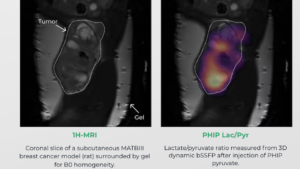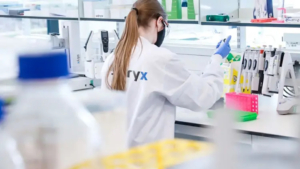
25 years IZB
Commemorative publication for the 25th anniversary of the IZB presents 70 profiles and visions of successful biotech start-ups. The 360-page publication describes the development of the Innovation and Start- up Center for Biotechnology into the leading biotechnology center in Europe
The Innovation and Start-up Center for Biotechnology (IZB) on the Martinsried campus is now a renowned location for the biotech industry, mentioned in the same breath as the globally recognized biotech centers in Boston and Silicon Valley in the USA. The start-up center started in 1995 with 1,000 m2 of laboratory and office space and five biotech start- ups. Since then 160 founders have chosen the IZB as their company headquarters. Today over 50 biotech start-ups with more than 700 employees are located on 26,000 m2. A look back at history shows that the site in the midst of the research institutes on the Martinsried / Grosshadern campus, as well as the extensive infrastructure features at the IZB are attractive location factors for company founders. 70 company profiles can be found in the 360-page commemorative publication. Particularly intriguing are the statements of the entrepreneurs, which clearly elucidate what drives them personally to invest in medicine of the future. And they are very successful. Between 2015 and 2020 alone, financing and deals worth over four billion euros were transacted at the IZB. Many biotech start-ups focus their research on the most severe diseases such as cancer, Alzheimer’s and autoimmune diseases. "I am pleased that the dynamism at the location has been unbroken for 25 years, and that especially in times of Corona, it is clear that our start-ups are doing top worldclass research," said Dr. Peter Hanns Zobel, Managing Director of the IZB, on the 25th anniversary of the IZB. The Bavarian Minister President Dr. Markus So?der and the Bavarian Minister of Economic Affairs, Hubert Aiwanger, both pay tribute to the importance of biotechnology and the IZB in Bavaria in their commemorative publication addresses.
In the beginning at the IZB
The first generation at the IZB included biotech companies such as MorphoSys, MediGene and Micromet. Who would have thought that these very first companies at the IZB would one day develop into the most renowned biotech companies in Germany. MorphoSys, with a market capitalization of 2.84 billion EUR (as of November 19, 2020) had its first cancer drug approved in the USA this year. Micromet, which specialized in cancer drug development, was sold to Amgen in 2012 for 1.16 billion US dollars after just seven years.
Innovative research approaches from start-ups at the IZB
Both the current start-ups and a selection of former start-ups are presented in brief profiles in the commemorative publication. In addition, an extra section is dedicated to the serial entrepreneurs. These company founders share one thing in common: They are passionate about their vision to cure diseases. Below are some statements by the start-ups taken from the commemorative publication:
New immunotherapies against cancer
In our drug development, we rely on the latest research results and international collaboration with the best researchers. CatalYm has specialized in innovative immunotherapies and develops approaches that improve the patient’s own immune system against cancer, explains Dr. Manfred Ru?diger, Managing Director of CatalYm GmbH. The company announced in November 2020 that it had closed its 50 million EUR series B financing round.
Improving the product properties of drugs
Michael Scholl, CEO of LEUKOCARE AG, supports his partners in their development of innovative drugs. Our goal is to improve the product properties of biopharmaceuticals for the benefit of doctors and patients alike. Applying LEUKOCARE’s formulation technologies enables diverse advantages, such as optimized applicability, increased stability and longer shelf life, transportation and storage at room temperature, and much more. Hospital stays can be avoided through simplified drug administration, which allows the patient to apply the medications themselves without having to rely on the assistance of a doctor.
Better diagnostics through AI-supported human samples
Dr. Sophia Doll, Managing Director of OmicEra GmbH is certain: We are at the beginning of a new era: the omic era. New "omic" technologies are revolutionizing medicine by creating large data sets for the molecular analysis of human samples. OmicEra diagnostics wants to catalyze this revolution. At OmicEra we offer mass spectrometric analyzes for human samples, such as blood plasma, body fluids, urine, and any type of FFPE or frozen tissue. Our results are based on innovative AI technology and thus maximize the information about the samples, explains Dr. Doll when describing her current research.
Developing new drugs that cross the blood-brain barrier
"Origenis’ vision is to use novel, small-molecule drugs to cure diseases for which medications have not yet been discovered. That’s why we are building up our AI innovation platform and using this to develop drugs of the future. Our BRAINstormTM and EYEdealTM technologies provide key data needed to overcome the blood-brain barrier or tear film that prevent most other drugs from reaching their target organ, as Dr. Michael Thormann, Managing Director of Origenis GmbH, explains his vision.
Best clinical research organization for epigenetic and epi-proteomic projects in Europe
Dr. Moritz Vo?lker-Albert, Managing Director of EpiQMax aims to create the best clinical research organization for epigenetic and epi-proteomic projects in Europe. "Our main motivation is to decipher epigenetic mechanisms in various diseases, because we are convinced that epigenetics is a key to further development of personalized medicine," says Dr. Vo?lker-Albert.
New drugs for chronic inflammatory and autoimmune diseases
Our mission is to develop safe, effective and comfortable new treatment options for people with chronic inflammatory and autoimmune diseases, explains Dr. Daniel Vitt, CEO of Immunic Therapeutics, who quickly transformed the company into a transatlantic, Nasdaq-listed company with a growing team and innovative pipeline.
Statements from former IZB start-ups
Dr. Christian Schetter, former Managing Director of Rigontec GmbH, who sold his company to MSD in 2017, gives the biotech entrepreneurs a piece of advice: Even under the best possible conditions, very few approaches really reach patients, despite interim successes. This is precisely why I think it is important to encourage young founders and scientists in particular to ensure that the next idea still deserves exactly the same enthusiasm and conviction. The cycle of innovation depends on this, especially in biotechnology."
Dr. Simon Moroney, former CEO of MorphoSys and current member of the Novartis Supervisory Board, answered the question of whether he would take exactly this path again with an overwhelming "yes". The technology platform that we have built up for the production of fully human antibodies has proven itself time and again, and MorphoSys has become the partner of choice for many pharmaceutical and biotech companies. As CEO, I had the privilege of running the company for 27 years, setting new technological standards, contributing to medical advances for the benefit of patients, and working with many dedicated and talented colleagues, says Moroney.
Deals at the IZB of over 4 billion euros from 2015 to 2020
The Martinsried start-ups have cooperated with international pharmaceutical companies from the start. From 2015 to 2020 alone, deals and financing worth over four billion euros were transacted at the IZB. Six start-ups were successfully sold during this period. In 2015, Baxter International acquired SuppreMol GmbH, which developed treatment options for autoimmune diseases and allergies, for 200 million EUR. In 2016, 4SC Discovery, which developed the 4Scan software for active ingredient discovery and optimization, was acquired by BionTech Small Molecules for 650,000 EUR. In the same year, Crelux GmbH, which specialized in structure-based drug research, was bought by the Chinese-American company WuXi AppTec. The proceeds from the transaction were not mentioned. The American pharmaceutical company MSD bought Rigontec GmbH for 464 million EUR in 2017. The company was developing a novel approach in cancer immunotherapy that promises immediate and long-term anti-tumor immunity. In 2018, Exesome Diagnostics, a developer of liquid biopsy tests, was taken over by the US company BioTechne for 575 million US dollars. ChromoTek GmbH was also of great interest to the American market, and Proteintech acquired the biotech company in 2020. The proceeds from the transaction were not disclosed.
COVID-19 projects at the IZB
Also in times of the Corona crisis, among others, entrepreneurs from the IZB are also working on future-oriented solutions. GNA Biosolutions GmbH will launch a rapid corona test onto the market in the winter of 2020. Immunic Therapeutics has entered into a clinical phase 2 trail for a COVID-19 drug, and both Eisbach Bio GmbH and Origenis GmbH have started to develop a new, specific active agent against SARS- CoV-2 viruses. Together with a European consortium, LEUKOCARE AG is developing a vaccine against COVID-19. Exosome Diagnostics, a developer of liquid biopsy tests, carries out COVID-19 tests in its clinical laboratories at the IZB. And Ella Biotech GmbH has also greatly expanded production in order to supply many companies with building blocks (oligonucleotides) for corona tests.
Nobel Prize winners and cutting-edge research on the Martinsried campus
On the Life Science Campus Martinsried, teaching, basic research and clinical research, as well as technological innovations are combined in one location. The close proximity to the top researchers on campus is what makes the location so attractive. Managing Director Dr. Peter Hanns Zobel has built up the IZB into an internationally recognized biotechnology location with an excellent infrastructure. In the new Faculty Club G2B (Gateway to Biotech) you can meet on-campus Nobel Prize winners, directors or junior research group leaders from the Max Planck Institutes for Biochemistry and Neurobiology, professors and scientists from the Ludwig Maximilian University, or outstanding physicians from the Grosshadern Clinic, as well as top researchers at the Helmholtz Center and the Center for Neurodegenerative Diseases (DZNE e.V.). The biotech start-ups are often spin-offs from the surrounding institutes, and the short distances encourage interactions and collaborations between biotech companies and research.
Statements from politics
The Federal State of Bavaria has successfully invested in biotechnology and is proud of its start-up center: the former Bavarian Minister of Economic Affairs, Dr. Otto Wiesheu called the IZB a biotope where biotechnology really grows. For the former Bavarian Minister President Dr. Edmund Stoiber, the IZB is an "outstanding high-tech project in the Federal State". Ex-Minister President Horst Seehofer speaks of a "lighthouse in the Federal State" and the current Minister President Dr. Markus So?der calls it "Biovalley in Germany". The Bavarian Minister of Economic Affairs, Hubert Aiwanger, made it clear in the opening address of the commemorative publication that the goal of the Bavarian State Government is to maintain and further develop biotechnology as a pillar of the Bavarian economy.
Link to the commemorative publication (Festschrift): www.izb-online.de/festschrift-25- jahre-izb/
Mehr Infos unter www.izb-online.de


 Courtesy Luca Nagel, Department of Nuclear Medicine, Klinikum rechts der Isar, School of Medicine, Technical University of Munich, Munich, Germany
Courtesy Luca Nagel, Department of Nuclear Medicine, Klinikum rechts der Isar, School of Medicine, Technical University of Munich, Munich, Germany Sitryx Therapeutics
Sitryx Therapeutics